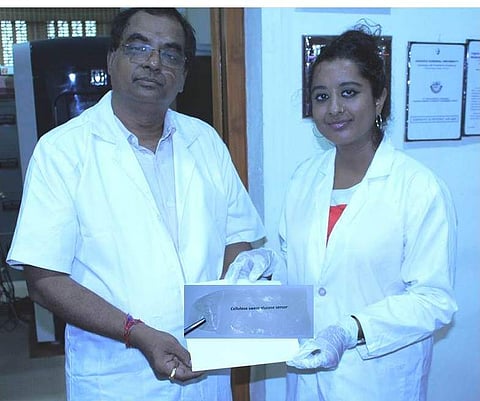

Talk to a few diabetic people around you and chances are that a lot of them will tell you that their days begin with a needle poke. This isn't as painful as an injection, but in order to monitor their blood sugar levels, they poke the tip of a finger with a lancet, after which they transfer the droplet of blood to a strip which goes into a glucometer, which then tells them their sugar level. This seems like a pretty easy deal for it only takes a couple of minutes of their time. However, the poking is not always easy, the strips are quite expensive and these are made of plastic and aren't biodegradable.
This is why one must pay attention to an invention by this researcher-guide duo in Chennai's Anna University, Preethi Ramadoss and Dr D Arivuoli. They have developed a biodegradable, self-adhesive, semiconductor that dissolves into human sweat and accurately detects the blood sugar and alcohol levels. "It is a composite of a cellulose derivative, derived from plants and wood," says Preethi. "This natural semiconductor is a very flexible and transparent film like Sellotape. Usually, semiconductors are toxic, despite being able to give good results. But this is a film-like material and is non-toxic," she says.
A lot of great discoveries in history were serendipitous. Preethi says that this was the case here too. "I was working on a super-absorbent to develop a biodegradable sanitary napkin. That was when I discovered this material. I didn't want to throw it away. I kept it aside and wanted to know more about its properties. That was when I found out that it was a semi-conductor," she says. "After a few other experiments, I found out that it detects glucose well and can be used to continuously monitor glucose levels," she says, adding that the material decomposes in the soil in 15 days.
Preethi and Dr Arivuoli say that upon commercial manufacturing, this material will reduce the glucometer's cost by three quarters. "We are hopeful to get it commercially manufactured and develop a device to use it in the next month. The aim is to develop it in the Anna University lab," says Dr Arivouli. At the same time, the strip can be connected to a smartwatch too, which will, in turn, show the reading.
An animal lover and activist, Preethi says that her research was completely cruelty-free. "We have tested this strip for biocompatibility too. For this, we cultured skin cells in the laboratory. Usually, researchers use fetal bovine serum to grow cells, for which pregnant cows are slaughtered. But here, I used blood serum from the blood bank, which was cheap too," she says, adding that the material is also antibacterial and hence, it can be safely used on any sensitive skin without causing any infections.
